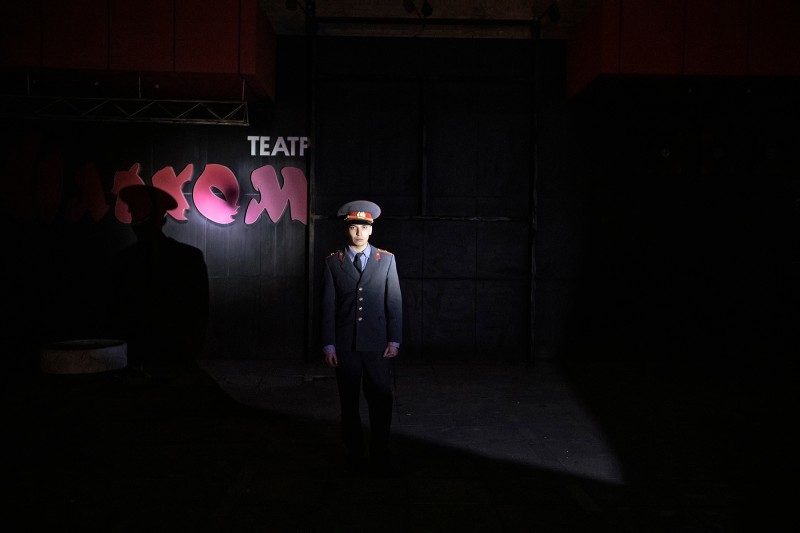Politics as Theater
On watching Gogol in Simferopol, and more.
On Friday, four regions in occupied Ukraine began voting in Moscow-orchestrated referendums on whether to join Russia. The vote, denounced as a sham by Western and Ukrainian officials, recalls the disputed Crimean referendum in 2014, which Moscow used to justify its annexation of the peninsula.
On the eve of the 2014 vote, journalist Dimiter Kenarov attended a satirical play by Nikolai Gogol in Simferopol, Crimea’s capital. The parallels between the production, which dealt with political corruption, and what he witnessed in the region were not lost on Kenarov. The referendum, he wrote, was “nothing more than theater-of-the-absurd: a group of people pretending to make a choice and others pretending to scrutinize the fairness of that choice, while in fact there was no choice at all.”
Theater, repression, and political freedom are intertwined not just in Crimea, but around the world. This collection of reporting and essays from the FP archives explores these connections, as well as efforts to keep theater in all its forms alive.—Chloe Hadavas
On Friday, four regions in occupied Ukraine began voting in Moscow-orchestrated referendums on whether to join Russia. The vote, denounced as a sham by Western and Ukrainian officials, recalls the disputed Crimean referendum in 2014, which Moscow used to justify its annexation of the peninsula.
On the eve of the 2014 vote, journalist Dimiter Kenarov attended a satirical play by Nikolai Gogol in Simferopol, Crimea’s capital. The parallels between the production, which dealt with political corruption, and what he witnessed in the region were not lost on Kenarov. The referendum, he wrote, was “nothing more than theater-of-the-absurd: a group of people pretending to make a choice and others pretending to scrutinize the fairness of that choice, while in fact there was no choice at all.”
Theater, repression, and political freedom are intertwined not just in Crimea, but around the world. This collection of reporting and essays from the FP archives explores these connections, as well as efforts to keep theater in all its forms alive.—Chloe Hadavas
Boryana Katsarova
Watching Gogol in Simferopol
Life imitates art in Crimea, where nothing seems real anymore except the tears and the vodka, Dimiter Kenarov writes.
People arrive to watch the actress Zsofia Szamosi perform in the play Pali at the Jozsef Katona Theater in Budapest on Jan. 18, 2019.Chris McGrath/Getty Images
Orban’s Macbeth
The tragic figure behind the Hungarian populist leader’s efforts to remake his country’s theater, according to Dariusz Kalan.
Alice Su
The Refugee Puppeteer
Inside Zaatari Camp, one volunteer is on a mission to help war-weary children overcome their disabilities and fears with theater, Alice Su writes.
NIB Studios
The Elephant in the Comedy Club
A troupe of popular young comics avoids mixing humor and politics in Rwanda, Kavitha Surana writes.
An actress prepares to go on stage at the Ilkhom Theatre on March 1, 2019. Matilde Gattoni for Foreign Policy
Tashkent Underground
The Ilkhom Theatre Company has kept freedom alive in Uzbekistan since before the fall of the Soviet Union, Matteo Fagotto writes.
More from Foreign Policy
How the Russian Oil Price Cap Will Work
Ignore the naysayers—the long-prepared plan is a smart way to slash the Kremlin’s profits.
‘They Are Pushing Everywhere’: Kyiv Goes on the Offensive
Ukraine may have achieved its biggest breakthrough of the war.
The Chinese Public Doesn’t Know What the Rules Are Anymore
Reckless policies have knocked out established norms.
The Last String of Russian Greatness Is About to Snap
A great classical music tradition might die because of the Ukraine invasion.

Join the Conversation
Commenting on this and other recent articles is just one benefit of a Foreign Policy subscription.
Already a subscriber?
.
Subscribe
Subscribe
View Comments
Join the Conversation
Join the conversation on this and other recent Foreign Policy articles when you subscribe now.
Subscribe
Subscribe
Not your account?
View Comments
Join the Conversation
Please follow our comment guidelines, stay on topic, and be civil, courteous, and respectful of others’ beliefs. Comments are closed automatically seven days after articles are published.
Change your username |
Log out
Change your username:
CANCEL
Confirm your username to get started.
The default username below has been generated using the first name and last initial on your FP subscriber account. Usernames may be updated at any time and must not contain inappropriate or offensive language.